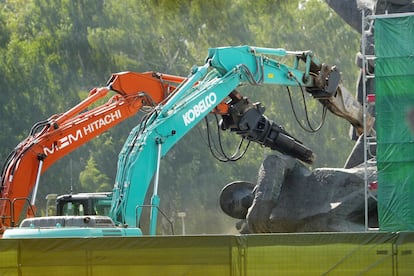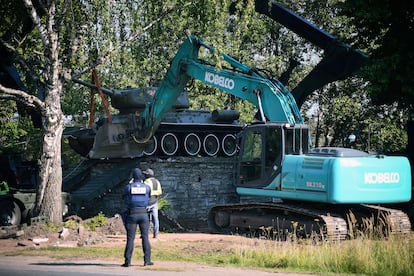The ‘war of monuments’ strains relations between Russia and Baltic republics to the limit
Kremlin propaganda links Nazism to purge of Soviet mark in Estonia, Latvia and Lithuania, where fears of Russian aggression mount

Nowhere in the European Union has the war in Ukraine had such a profound impact as in the Baltic republics, where the perception of fragility and vulnerability to Russian expansionism has been exacerbated and the traumas of Stalinism have been stirred up all over again. While the governments of Estonia, Latvia and Lithuania are accelerating plans to demolish the remaining Soviet monuments in their public spaces and to eradicate Russian teaching from their educational systems, the Kremlin is exploiting the process of decommunization on the Baltic shores, reinforcing its propaganda and trying to fuel existing ethnic frictions, especially in Latvia and Estonia. In a fresh escalation of tension, over 60 politicians from the three states are being traced and arrested.
“In all three countries there is a deep emotional bond with Ukraine,” summarizes Dovile Budryte, a Lithuanian university professor who lives in Atlanta. She points out that the Baltic republics only survived as independent countries for slightly more than 20 years in the interwar period, before enduring occupations by the Red Army and another by Nazi Germany. “Over the past two years, a large part of the population has realized how dependent they are on NATO’s support. And there is uncertainty about what the future holds,” adds Budryte, who specializes in collective memory and trauma.
In Estonia, Latvia and Lithuania — the only former Soviet republics belonging to the EU and NATO — the knocking down of statues and busts of Lenin began in the late 1980s, when the USSR was weakening and Moscow’s grip was loosening. After independence, the iconoclastic spirit faded away. Russia’s illegal annexation of Crimea and the first clashes in Ukraine’s Donbas region in 2014 reignited the appetite for eliminating traces of the Soviet past. However, since the full-scale war began 24 months ago, the purge has intensified more than ever. Hundreds of monuments have been demolished or removed and countless streets, parks, theaters and schools have been renamed.
The Kremlin ties the demolition of the Soviet legacy in the Baltic republics to its narrative about the alleged return of the ghost of Nazism. The remembrance of World War II is sacred to the Russians. President Vladimir Putin likens the German Leopard tanks supplied to Ukraine to the Panzers of the Third Reich, and makes an uncertain parallel between removing Soviet statues and being a Nazi collaborationist.
Search and arrest warrants
On February 13, the Russian government arrested Kaja Kallas, the Estonian Prime Minister, and dozens of Baltic politicians. “They must answer for crimes against the memory of those who liberated the world from Nazism and fascism!” proclaimed Maria Zakharova, foreign spokeswoman. In 2020, Putin enacted a law that punishes those who destroy Soviet-era monuments abroad with a five-year jail term. Maria Mälksoo, a researcher at the Center for Military Studies at the University of Copenhagen, argues that “Russia is attempting to appear as if it has the right to apply its legislation in the post-Soviet territory, and is sending a message to the rest of the world that it intends to erode and weaken the sovereignty of the Baltic countries.”
Some demolitions, such as that of the Victory Monument in Riga, have aroused tension and controversy. Thousands of members of the country’s Russian minority would gather around the imposing 79-meter obelisk in the center of Latvia’s capital every May 9 to commemorate the defeat of the Nazi army. Although the authorities banned rallies and demonstrations in support of its preservation, police intervention during several incidents resulted in the resignation of Marija Golubeva, the minister of the interior. The situation in Daugavpils was even more tense. In the country’s second-largest city, where more than 80% of the population speaks Russian, the mayor defied the order to remove two monuments to the bitter end and dozens of arrests were made.
“I was afraid that certain demolitions would cause serious unrest in the streets of Latvia,” says Martins Kaprans, a researcher at the University of Riga who specializes in the Russian-speaking population of the Baltics. Several polls reflect the deep discrepancies, on issues ranging from the war in Ukraine to language policy, between the Latvian majority and the quarter of the population that the Russian minority comprises. In a recent opinion poll, 26% of Russian speakers surveyed — “fifth columnists,” according to some Latvian nationalist politicians — reported having a positive opinion of Putin. Kaprans argues that the Russian community is no longer as cohesive as it was 35 years ago, and that younger generations regard identity issues as less relevant.
In both Latvia and Estonia, part of the Russian minority is stateless — they have no citizenship and no political rights, but they hold residence papers and have access to social benefits. In 2022, the Latvian government informed more than 25,000 people that they must take a test in the country’s only official language in order to stay in Latvia. One third of the examinees — who failed — were granted a two-year extension to broaden their knowledge, but a few thousand, who did not show up or did not submit the required documentation, will lose their residency status within a few months.
Russian public television recently aired a special prime-time program in which “the Nazis who rule Latvia” were accused of being “the worst Russophobes in existence” and of wanting to “implement a monoethnic state.” Despite Russian media being banned in Estonia, Latvia and Lithuania since the invasion of Ukraine, a part of the population still accesses it illegally — the only thing they have consumed for decades.
In December, Putin claimed that Russian-speaking citizens in Latvia are treated “like pigs.” In the past, the president has used the situation of the Russian-speaking population as a justification for the occupation of territories in Georgia and Ukraine.
Narva, Estonia’s third-largest city, was named in one of Putin’s imperialist speeches as one of the places where the persecution of the Russian-speaking population is most evident. “It seems that we have been destined to restore and strengthen the sovereignty of the country and its ancestral territories,” he stated in 2022 at a forum, shortly after drawing parallels between the invasion of Ukraine and the 1704 military campaign in which Tsar Peter the Great “recaptured Narva after defeating the Swedes.”
Eradicate teaching in Russian
97% of Narva’s inhabitants speak Russian. Many of them disapprove of the policies that suppress their mother tongue, which is not even visible on tourist information signs. In a few years’ time, classes in Russian will disappear from schools in Narva, and from all schools in the Baltic republics. Estonia, Latvia, and Lithuania are pressing ahead with their respective plans to eradicate the world’s seventh most spoken language from their education systems, with teacher replacement representing the biggest obstacle. In addition, the three Baltic republics have severed all ties with the Russian Orthodox Church.
In Narva, arrests were made on the eve of the removal of a Soviet tank that had been perched on a stone base for more than half a century. Nevertheless, the disturbances were relatively minor compared to those in Tallinn in 2007, when the dismantling of a Soviet statue sparked the most brutal riots that have taken place in Estonia since its independence.
In the Russian town of Ivangorod, separated by the Narva River from the city of the same name, a replica of the T-34 — the tank that was removed in the neighboring town and is a sacred symbol of the Great Patriotic War for Russian nationalism — has been stationed, pointing towards European territory.

While the Baltic countries are pulling down the memories of oppression, the Kremlin is honoring their repressors and in Moscow it has rebuilt the monument to the founder of the Cheka (the All-Russian Extraordinary Commission), Felix Dzerzhinsky, opposite the headquarters of the Federal Security Service, the former KGB. In several remote areas of Russia, memorials to Lithuanians who were the victims of the deportations imposed by Stalin in the 1940s, also experienced by Latvians and Estonians, have been removed.
The war in Ukraine has also led to the eradication of the references to Alexander Pushkin in Eastern Europe. The poet, who died 80 years before Lenin seized power, has now all but disappeared from the streets of dozens of Baltic and Ukrainian cities. The Kremlin, which clamors against those who destroy statues of Pushkin, has unveiled monuments dedicated to the great poet of the Russian Empire in Caracas and Damascus. “The Russian narrative no longer revolves around a small military operation [in Ukraine], but a confrontation of civilizations in which Moscow is protecting its identity,” stresses Intigam Mamedov, an expert on Eastern Europe and researcher at the University of Northumbria.
The fear of Russian aggression has spread further in the Baltic countries as a result of the latest setbacks experienced by Ukraine. On Tuesday, the Estonian government announced the arrest of 10 alleged Russian agents. This month, foreign minister, Margus Tsahkna, and his Lithuanian counterpart Gabrielius Landsbergis insisted on the high likelihood of Russia attacking any of the three countries in the next four years. Latvia has recently reintroduced compulsory military service, while Lithuania brought it back in 2015, and in Estonia it was never abolished.
Solidarity with Ukraine has shown signs of faltering in the United States and in several European countries, but not in the Baltics. The governments of Estonia, Latvia and Lithuania have emerged as some of the most loyal and staunch supporters of the Ukrainian cause, and have gained clout in Brussels and on the international scene. They are no longer as alarmist and paranoid as those who, back in 2006, were already warning of the threats posed by Putin. At the 2008 NATO summit, Lithuania alone demanded “immediate accession” of Ukraine, and was the first country to devise a strategy to disassociate itself from Russian gas, and the only ally to supply lethal weaponry to the Ukrainian military between 2014 and 2018.
Sign up for our weekly newsletter to get more English-language news coverage from EL PAÍS USA Edition
Tu suscripción se está usando en otro dispositivo
¿Quieres añadir otro usuario a tu suscripción?
Si continúas leyendo en este dispositivo, no se podrá leer en el otro.
FlechaTu suscripción se está usando en otro dispositivo y solo puedes acceder a EL PAÍS desde un dispositivo a la vez.
Si quieres compartir tu cuenta, cambia tu suscripción a la modalidad Premium, así podrás añadir otro usuario. Cada uno accederá con su propia cuenta de email, lo que os permitirá personalizar vuestra experiencia en EL PAÍS.
¿Tienes una suscripción de empresa? Accede aquí para contratar más cuentas.
En el caso de no saber quién está usando tu cuenta, te recomendamos cambiar tu contraseña aquí.
Si decides continuar compartiendo tu cuenta, este mensaje se mostrará en tu dispositivo y en el de la otra persona que está usando tu cuenta de forma indefinida, afectando a tu experiencia de lectura. Puedes consultar aquí los términos y condiciones de la suscripción digital.








































